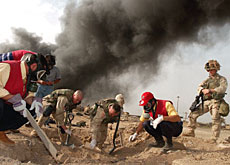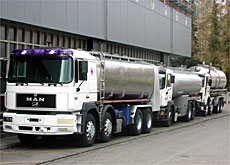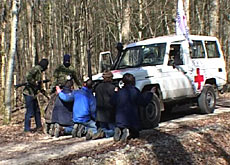Charity begins at home for Swiss Red Cross

While attention focuses on the work of the Red Cross movement in countries stricken by war, famine and disease, the Swiss society has its work cut out on the home front.
In Switzerland, the needs of immigrants and families living on the breadline are becoming an increasing concern.
On Thursday, Red Cross members across the world are marking World Red Cross Red Crescent Day and what would have been the 175th birthday of the organisation’s founder, Henry Dunant.
Dunant, himself Swiss, founded the Red Cross in 1859. When he witnessed the inadequate treatment of wounded soldiers on the battlefield of Solferino in northern Italy, he began mobilising helpers to tend to them.
The Red Cross organisations are using the anniversary to launch campaigns for the victims of the war in Iraq and the Aids crisis in Africa.
Social assistance
But as Swiss Red Cross spokesman Beat Wagner explains, although the organisation’s work abroad gets more media attention, its priority is to attend to the needs of its own citizens.
“The main field of activity is still social assistance, rescue services and health care in Switzerland and, there, needs are developing,” he told swissinfo. “The composition of the population is changing and we need to adapt and anticipate such trends in society.”
He added that most of what the Swiss Red Cross receives goes into funding aid and services in Switzerland.
The organisation provides a range of services including health care, first aid courses and rescue teams.
Immigration and poverty
According to Wagner, the Swiss Red Cross is particularly concerned about two issues that have come to light in recent years.
Firstly, the increasing number of immigrants has created new problems.
Many immigrants arrive in Switzerland unable to speak the language, with nowhere to live and no idea of the social services available to them. They may also encounter resentment from Swiss citizens unhappy with their presence.
Another growing problem is the number of families struggling to make ends meet. The recent economic downturn has aggravated the problem, as has the rise in single-parent families.
“We need to find new ways of dealing with these issues, which are still very new,” Wagner said.
The organisation has already responded to the rise in immigration by setting up asylum centres and supplying information on health care and social services.
Funding concerns
The Swiss Red Cross is considered to be among the better-funded Red Cross organisations, owing much to state support.
The Swiss government and other public institutions supply between 15 and 20 per cent of the annual budget of the Swiss Red Cross.
The government also actively promotes the organisation. On Thursday, the Swiss President, Pascal Couchepin, praised the Red Cross’s work and asked the Swiss population to continue to support the organisation.
But this state support may soon no longer be assured. The government is currently considering cuts in public spending, and humanitarian organisations are among the institutions under scrutiny.
“If these cuts come they will have an immediate effect on our budget,” Wagner said.
“And it will not only affect our organisation… but also those who receive our services.”
In this case the Swiss Red Cross would have to look elsewhere for funding, and compete with the increasing number of humanitarian organisations vying for support.
swissinfo, Joanne Shields
A Swiss, Henry Dunant founded the Red Cross in 1863.
The organisation’s main principles – neutrality and impartiality – were based on Switzerland’s own principles, while its emblem is an inversion of the Swiss flag.
The International Red Cross and Red Crescent movement has three components.
The International Federation of the Red Cross and Red Crescent Societies, through its 178 members, focuses on disaster management and healthcare.
The International Committee of the Red Cross is a private Swiss institution that provides aid and protection to victims of conflict and is the guardian of the Geneva Conventions.
The national Red Cross societies represent the organisation locally. In some countries the societies are known as the Red Crescent.

In compliance with the JTI standards
More: SWI swissinfo.ch certified by the Journalism Trust Initiative



You can find an overview of ongoing debates with our journalists here . Please join us!
If you want to start a conversation about a topic raised in this article or want to report factual errors, email us at english@swissinfo.ch.